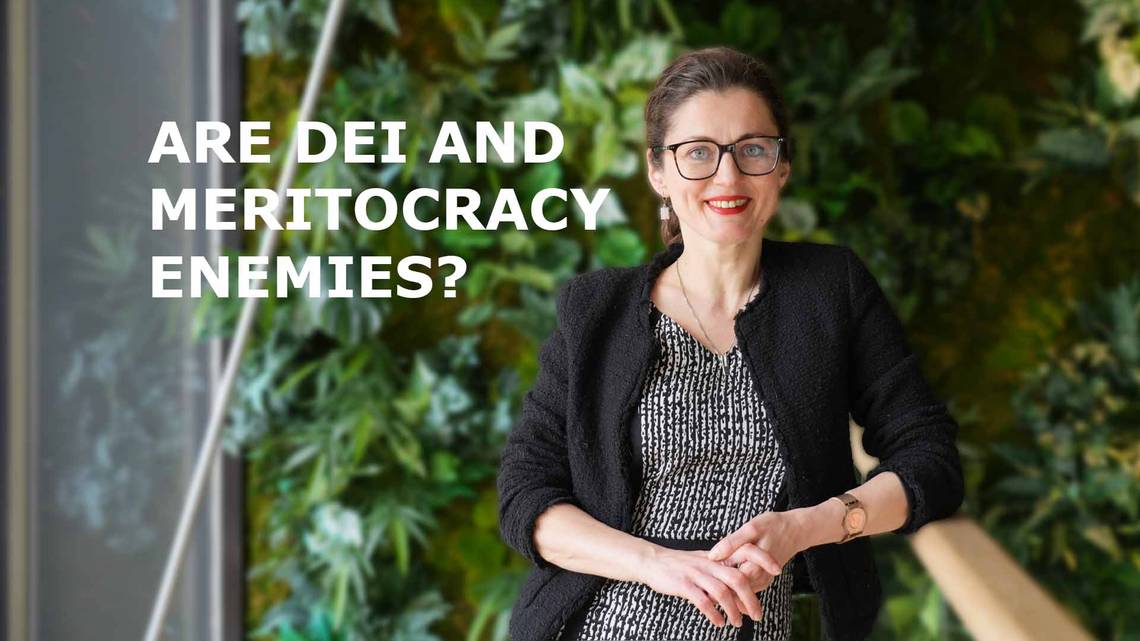Is DEI the enemy of meritocracy in organisations?
By Andreea Gorbatai
Professor of Entrepreneurship
An HR strategy of ‘Merit-Excellence-Intelligence’ (MEI) is the new rallying cry of critics of Diversity, Equity, and Inclusion (DEI) initiatives in large organisations within the US and abroad. The proponents of this approach portray DEI efforts as opposite to ‘true’ meritocracy. They claim that advocates of diversity initiatives prioritise the hiring of minorities to the disadvantage of qualified candidates belonging to socio-demographic groups that have dominated high-status positions in the past.
But are DEI initiatives really based on the idea of doing away with meritocracy, of taking merit off the list of evaluation criteria for hiring, rewarding, and promoting our talent?

A false dichotomy
The vast majority of DEI implementations aim to attract, hire, and promote individuals belonging to marginalised categories based on their under-recognised talents and skills, not their demographic characteristics. Hence implementing better merit-based policies has long been a core principle of diversity, equity and inclusion work. Both academic research and real-life experience show that hiring, rewarding, or promoting minority candidates without the necessary qualifications is a disservice to the candidates, to the disadvantaged categories they belong to - as it perpetuates negative stereotypes - and to the organisations themselves.
The proponents of MEI are quick to point the finger at scandals surrounding women and minority hires who made mistakes or appeared to be underqualified for their positions, as evidence of reverse bias against more qualified, majority-group candidates. There’s no evidence pointing to this being statistically true. And there’s a very big “if” in the assumption that such seemingly failing minority candidates - especially those hired or promoted to positions of high status, visibility, and power - have benefitted from favourable organisational conditions and from mentorship and support to the same extent as their peers. More often than not, they are set up in a ‘glass cliff’ position, being offered a position of leadership during a period of downturn, scandals, or high failure risk.

Are DEI and meritocracy enemies?
In this video, Professor Andreea Gorbatai explains why DEI efforts are not opposite to meritocracy, and not an enemy to productivity and value creation.
What is merit – and are the right metrics used?
To evaluate one’s “merit” in hiring decisions, commonly used metrics are one’s educational credentials and professional test scores, or breadth, depth, and type of extracurricular activities. If we take a deeper look, we understand that many of such metrics can easily serve to reproduce existing inequalities in relation to one’s family of origin, wealth and social class, but also socio-demographic characteristics. For example, candidates from a disadvantaged educational or economic background will not have had the same support and advice network or financial resources as their better-off peers to prepare for and gain admission to some of the top law programmes in the field. And, where such candidates have been admitted to top programmes, they might not have been able to take advantage of unpaid internships or career networks and alumni club events at the same rate as their peers since they are more likely to have had financial responsibilities or caretaking obligations throughout their academic careers. Conversely, evaluating candidates with international backgrounds may present a challenge as their resumes are difficult to ‘translate’ or compare with the local candidates’ trajectory, both in terms of credentials, such as their university affiliations and professional certifications, and performance metrics, such as scores and grades.
“We are not biased; we are a meritocratic organisation!”, many insist. Yet, for all of us, the unfamiliar is uncomfortable. And the responsibility for making an unconventional hiring choice is heavier and harder to justify for a hiring manager than is discounting a non-traditional, minority hire. The same goes for the burden of investing additional effort to assess a foreign or otherwise unconventional resume.
Assessing minority hires – double standards
Further, once minorities are hired by a top firm, the promise of meritocratic evaluations remains dubious. In the absence of equitable talent management, well-qualified minority hires might not have access to the same career support and staffing opportunities as their peers. This is often a result of organisational policies that fail to challenge biases and prejudices casually baked into organisational life. For example, informal staffing policies that rely on senior partners selecting their own teams may result in skilled and talented minority hires being excluded from opportunities because they do not comfortably ‘fit in’ with the clients, or with the rest of the team. They might not be able to socialise with the clients after hours as smoothly as their peers, because they do not drink alcohol, or play golf; or they miss out on informal communications and bonding opportunities with the team because everyone else speaks the local language in casual interactions, although the official, ‘professional’ language is English. Even more insidiously, senior managers and partners may find it difficult to give advice to a junior minority hire – or might give inappropriate, inapplicable advice – because they are unaware of how their particular privileges have benefitted their own career trajectories in ways that are not applicable to minority talent. Think of gender, nationality, class, religion, education, first language, or health. As a result, a few years down the road, minority hires may be “objectively” lacking in adequate skills or experience when they are evaluated for promotion and subsequently fall behind their equally talented, or even less talented, and motivated peers.
Well-designed DEI initiatives take on structural obstacles that prevent women and minority individuals from attaining high positions and positive outcomes in organisations compared to the majority group. They highlight that, by nature of being a minority in an organisational setting, specific metrics might be more difficult to reach, requirements set more strictly, or some expectations may be set higher, all else held equal.
For example, research has pointed to the gender differences in the allocation of ‘unpromotable’ work in organisations. Women are often asked - and expected to happily take on - a wide array of organisational caretaking and social tasks that are not considered in promotion evaluations. Tasks such as retirement parties, birthday celebrations, and emotional support are disproportionately passed on to women employees, without appropriate recognition or rewards. Additionally, as DEI initiatives take hold and are showcased by organisations as a signal of commitment to change, many minorities in the workplace find themselves pressured to participate and ‘represent’ minority voices in events, committees, panels, and juries. All the while, such contributions are often not considered in subsequent reviews of their personal growth and career development.
DEI – friend or foe?
Diversity, equity and inclusion policies do not challenge the principle of hiring, rewarding, or promoting the most qualified person for the job, but rather seek to improve on the implementation of this principle. They challenge the extent to which the criteria and the tools we use to systematically assess merit disadvantage particular socio-demographic categories and perpetuate existing historical and systemic inequalities in the workplace and, more broadly, in our communities.
A DEI-informed talent management strategy aims to bring organisations closer to the Platonic ideal of a merit-based society, as it aims to remove unfair, long-standing barriers for minority groups and contends with the outdated, colonial, patriarchal, heteronormative, and ableist prejudices inherent in current ‘meritocratic’ organisational policies.
Source: LDIA Magazine (Legal Diversity & Inclusion Alliance); December 2024. Slight edits were made compared to the originally published version of this article.
Get in touch!
Andreea Gorbatai
Associate Professor in Entrepreneurship Chair of the Diversity, Equity and Inclusion Committee
